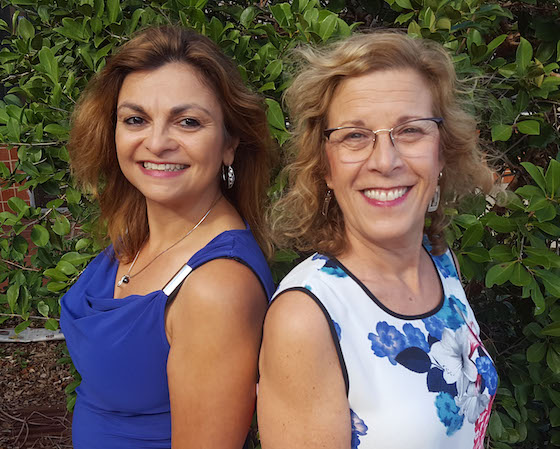Sex Ed Boot Camp

Authors and sexologists Dr. Joni Frater and Esther Lastique will host Sex Ed Boot Camp at Hood College on Thursday, February 10 at 7 p.m. They use a science-based approach to address your most challenging questions about sexuality and healthy relationships in a judgment-free zone. Get to know them in the interview below!
Q&A with Dr. Joni Frater and Esther Lastique
Why did you start Sex Ed Boot Camp?
We first started out just talking to couples. In 2009, we published our first book, Love Her Right. It was targeted to married men. In the book, we share our insights as women and as a lesbian couple. Our goal was to help men elevate successful relationships with the women in their lives. We did more than 300 radio and TV interviews, and had lots of people tell us they were in loveless, sexless marriages. We helped where we could, but for many people, the choices they had made came from a lack of information and unrealistic expectations about relationships. We realized that if we wanted to truly talk about healthy relationships and celebrating sexuality, we needed to reach a younger audience. We had three nephews and a niece that were college-aged, and the level of STIs and unplanned pregnancy within that population was astounding. With some research, we learned that so many students have little to no basic information on sexual health, so we pivoted to the college market. Our first SEBC program was in October 2010 and here we are!
What do students get out of the program?
What we hope students get primarily is a sense of empowerment over their own choices, bodies and sexuality. You have dominion over your body. Only you get to decide who touches you and how. Learn how to set your boundaries and communicate them with confidence. Learning about what makes you feel joy—emotionally, intellectually, spiritually and sexually—is all part of becoming a fully formed adult. Take some time for introspection, decide what you want your pursuit of joy to look like and make sure the people you welcome into your life are worthy of you. Mutual respect is a great starting point for making mutual pleasure your goal. It all starts with loving yourself, and teaching others how to love you in ways that make you feel seen, heard and safe. Learn to be a great communicator!
What is Sexual Responsibility?
Sexual Responsibility encompasses many things. In any sexual encounter, we are each responsible for communicating what we want and what we do not want. We never assume someone is consenting to sexual activity. We must have clear, participatory, enthusiastic, verbal and sober consent for every act, every time. Sexual responsibility also means being prepared—practicing safer sex for every single act and understanding that if your body can get pregnant, you should take measures to prevent that until it’s your choice to start a family. Being sexually responsible is another way to honor your body, your boundaries and your partner.
How to be your best medical advocate?
For many students, this may be the first time they experience a lot of adult responsibility, like paying for school, doing laundry and making doctor’s appointments. The better you get to know yourself—both mentally and physically—the more prepared you will be to advocate for yourself. If something changes, if your body starts doing things differently or your mental state shifts, it’s time to ask for help. It’s also great to join with your social circle to support each other through hard times and help each other advocate when you need it. Seek out counseling if you need to talk confidentially to someone.
What is the risk for STIs in college aged students?
This may blow your mind: today, 75 percent of 18- to 24-year-olds are destined to get an STI in their lifetime. 50 percent of them will get one while in college. Yes, these numbers are crazy real!
Get used to getting tested for STIs—every time you change partners or every six months, whichever is more often. Practice safer sex for every single act every single time. That includes oral play and using toys. We have true stories that will convince you condoms, birth control, emergency contraception and pre-exposure prophylaxis (PrEP) should all be a part of your healthy sexuality tool box.
Getting diagnosed with an STI is not the end of the world. This does not define who you are. Sharing your status can be difficult, but it’s necessary to both keep you safe and to honor your partner’s health. Treatment for most STIs is available, although some viral infections can affect the rest of your life and even cause cancer. No matter what your status is, you are still entitled to and deserve a full and joyful sex life. If you have a partner with an STI, safer sex is your best path to pleasure while playing safe and keeping you negative.
Keep each other safe too—who’s responsible for bringing the safer sex products to the encounter? Everyone who’s playing! Find out what brands and sizes of condoms and lube you like best, and see if the wellness center carries them. Learn what products to use for which acts. As students, you have power. Everyone here at Hood College wants to provide the tools needed to keep you all safe, healthy and in school.
Don’t miss Sex Ed Boot Camp on Thursday, February 10 at 7 p.m. in Rosenstock Auditorium. The event is only open to current Hood students. Admission is free.
Are you ready to say Hello?
Choose a Pathway
Information will vary based on program level. Select a path to find the information you're looking for!
